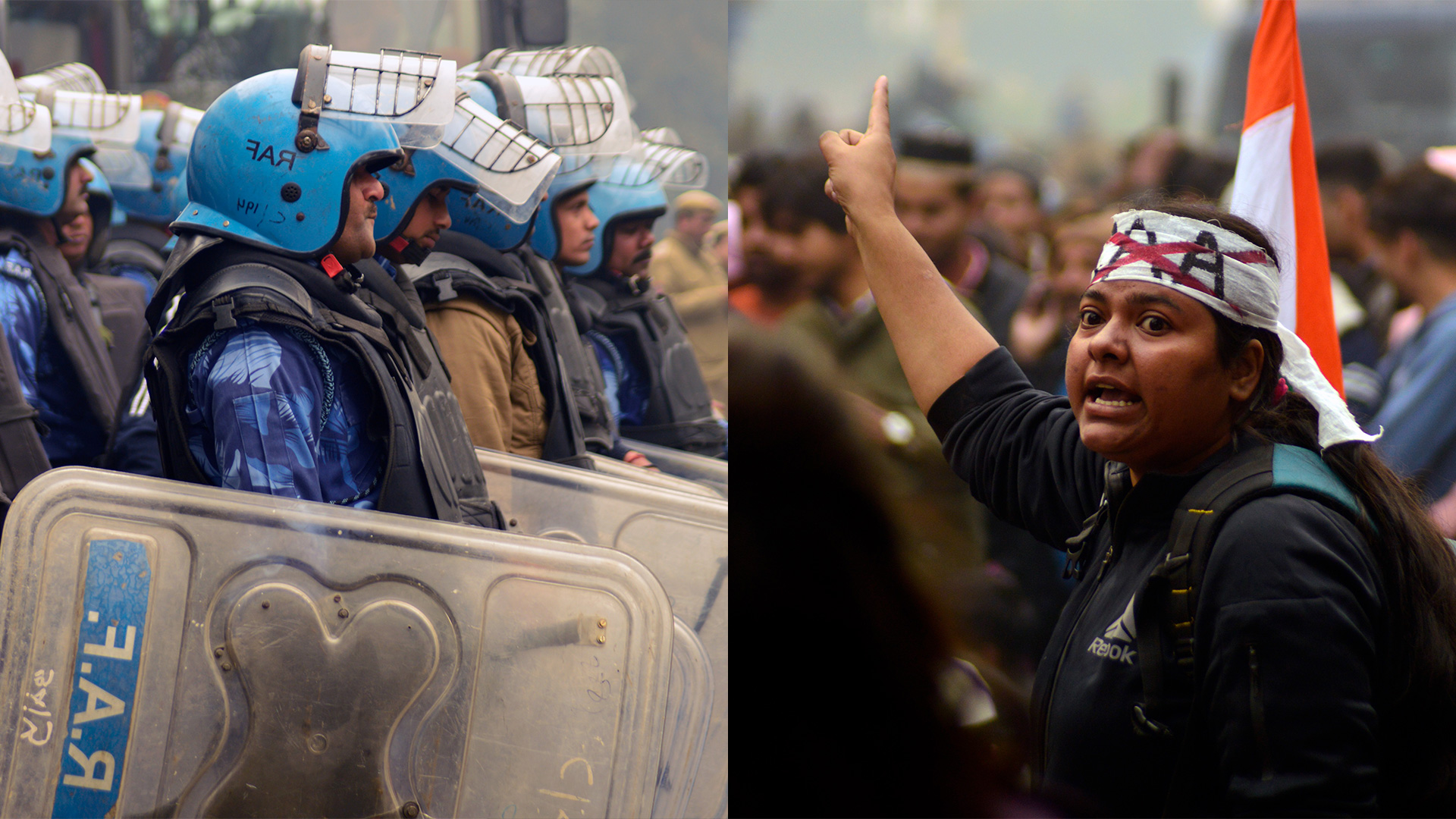Massive protests have broken out across India over the discriminatory and divisive Citizenship (Amendment) Act (CAA) that was passed into law by the far-right Bharatiya Janata Party government of prime minister Narendra Modi. Hundreds of thousands of protesters have been taking to the streets in both major cities and smaller towns against the law that critics say, will end up turning Muslims into second-class citizens of the country. The response of the national and state governments, especially those controlled by the BJP, has been extremely violent with cases of tear gas fire, curfews, mass detentions and internet shutdowns being reported across the country.
Two people were killed in the southern Indian town of Mangaluru, reported Reuters.
Police lobbed tear gas shells, resorted to baton charge and fired in the air to disperse anti-CAA protesters in Mangaluru, as thousands of demonstrators hit the streets in many cities and towns across the state of Karnataka on December 19, Thursday, defying prohibitory orders.
Protest turned violent in Mangaluru. Shots fired to disperse the crowd. Curfew in five police station limits till Friday night. #CitizenshipAmendmentAct pic.twitter.com/li4YUlXQuI
— Harish Upadhya (@harishupadhya) December 19, 2019
In the capital city New Delhi, hundreds, including Left leaders, such as Sitaram Yechury and D. Raja and activists Yogendra Yadav and John Dayal, were detained for taking part in the anti-citizenship law stir defying prohibitory orders.
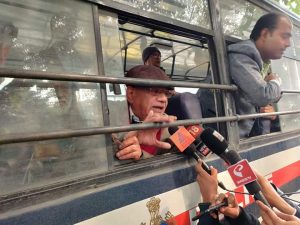
In Delhi, Section 144 was imposed by Delhi Police in the heart of the city in Red Fort and Mandi House area, where two protest calls had been given. Section 144 prohibits the assembly of four or more people in an area. This did not deter thousands of students and activists from converging there to raise their voice against CAA and the police crackdown in Jamia Millia Islamia University and the Aligarh Muslim University.
Telecom operators Airtel, Vodafone Idea and Reliance Jio also suspended internet, voice and messaging services in parts of Delhi and the National Capital Region following instructions from the police in the wake of the protests. The Delhi Metro closed as many as 20 stations.
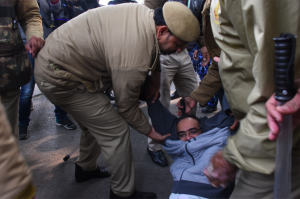
“India today has the ignominy of being the largest internet shutdown in the world. It is unacceptable. Metro stations were closed. This is worse than what we saw during the Emergency. The manner in which they are dealing with democratic protests is unacceptable,” said Sitaram Yechury.
“Today’s protests showed the determination of youngsters to not let democracy be butchered. This was not a one off protest, such protests will continue,” said Yechury, who along with other Left leaders, had called a nationwide protest against the law.
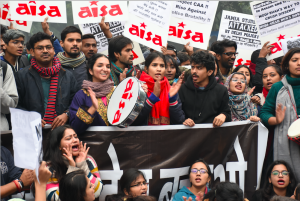
In Delhi, the police put the agitators into buses in a bid to clear the Red Fort and Mandi House area and took them to different parts of the city. While the police was forcing the protestors into buses at Mandi House, some of the students began marching in the other direction and walked till the Parliament street. Some of the people who were taken away in buses were left off on the outskirts of the city from where they made their way back to Parliament street to join in the protests.
Bengaluru
In the city of Bengaluru, historian Ramachandra Guha, activist Geeta Menon and many others were detained at the Town Hall area.
Even some protesters who were standing alone – which is not a violation of Section 144 – were detained. The prohibitory law was imposed in Bengaluru as well.
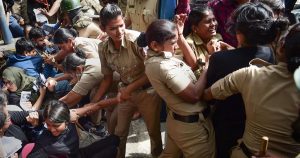
Reacting to his detention, Guha said it was “absolutely undemocratic” that police were not allowing even a peaceful protest, which is the democratic right of citizens.
Police also detained hundreds of people, including more than 30 students from National Law University who had gathered outside Town Hall on Thursday morning.
Kolkata
In Kolkata, the Left Front took out a massive rally, joining the country-wide protests by opposition parties.
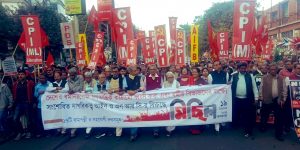
Senior CPI(M) leader Surjyakanta Mishra said: “This is the time to foil BJP’s dangerous game plan to divide the country. The Left will do everything to protect the country’s integrity and secularism.”
In another rally, Trinamool Congress supremo and state Chief Minister Mamata Banerjee called for a UN-monitored referendum over the amended Citizenship Act and the proposed nationwide NRC. She said BJP will have to quit if it fails such a “mass vote”.
Mumbai
Nearly 200,000 of people on Thursday protested against the Citizenship Act at Mumbai’s August Kranti Maidan, the place where in 1942 Mahatma Gandhi told the then British rulers to quit India.

The gathering included workers of political parties, students and also a smattering of Bollywood personalities, who made out a strong case against the Act and the NRC.
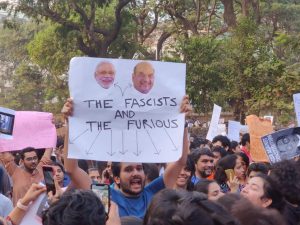
Noted freedom fighter G G Parikh, 94, who participated in the Quit India movement of 1942 against the British colonizaers, was present at the Maidan. College students, IT professionals and members of various communities also participated in the protest.
Lucknow
Protesters came out in large number across the State of Uttar Pradesh which is ruled by Adityanath, one of the most extremist leaders of the BJP. Police fired teargas shells in the capital, Lucknow and other parts.
Photos from Lucknow where people have gathered against the Citizenship Amendment Act. The call was given by the Left Parties and other organisations. #NOtoCAA pic.twitter.com/n7auGLJjVj
— CPI (M) (@cpimspeak) December 19, 2019
Internet services remained suspended for at least part of the day at various places, including Aligarh, Sambhal, Mau and Azamgarh districts.
Section 144 has already been in force in the entire state for several days now.
In Aligarh, teachers from the Aligarh Muslim University, the scene of violence and brutal police attack on Sunday, also took out a protest march.
Kerala
The Communist Party of India (Marxist)-led Left Democratic Front (LDF) organized protest marches across Kerala following the call of Left parties.
In Kerala, which has continuously been witnessing peaceful protests against CAA, the LDF organized protest gatherings at all district centers on Thursday evening which saw massive participation by student, women, workers and other organizations.
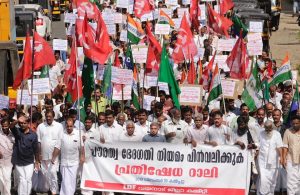
In Thiruvananthapuram, members of the left-wing Democratic Youth Federation of India marched to protest the detention of peaceful protesters across the country.
Amidst country-wide protests against CAA, Kerala chief minister Pinarayi Vijayan wrote to the Home Minister Amit Shah detailing his concerns over the attack on student community in Jamia and AMU, including ones from Kerala.
Youth League, the youth wing of Indian Union Muslim League, has also urged its members to organize against the illegal detention of protesters in various parts of the country.


